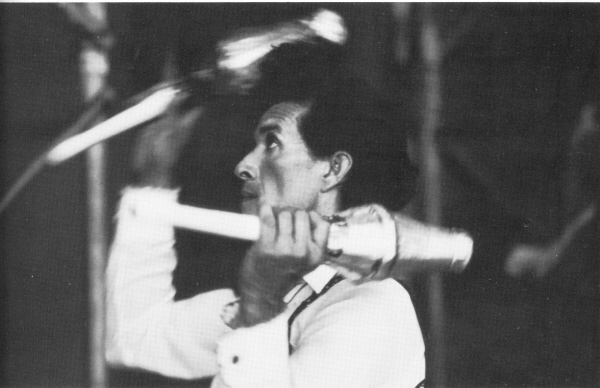
Osmar (photo by Lynda Arnold) |
Page 15 June 1984
|
Osmar
has always worked solo, but welcomed the opportunity to work with me.
There are very few jugglers in . Nicaragua, and no recreational
jugglers or weekly get-togethers at the local park or University. This
is partly because few people in this struggling country have the
leisure time or extra money for equipment.
But,
although the circus is popular as entertainment, it is felt to be
somewhat vulgar. There is little or no street performing, and
Nicaraguans were baffled by why a juggler might choose to work the
streets, possibly preferring it to organized circus work.
Osmar's
insistence on a polished visual presentation adds to his appeal as a
performer. As his willing student and partner, I drilled with him on
entrances, transitions, bows, and exits with the same precision
devoted to the technical skill of take-aways and pirouettes. Some of
that theatrical polish he learned as recently as last fall during an
A.S.T.C.-sponsored workshop with visiting circus artists from Cuba.
They hope to make these free workshops an ongoing feature of
government support for the arts.
With
juggling as our only common language, rehearsal became an interesting
challenge. With much laughter and sweat,
we progressed, day by day. As my Spanish gradually improved we
developed a working vocabulary for feedback - mas vuelta (overspun),
menos vuelta (underspun), mas alto (higher). Calling them clavas and
pelotas instead of clubs and balls felt as familiar as identifying
myself as a malabarista (juggler). For my next visit to Nicaragua,
Osmar insisted we would work on sombrero y cigarillo (hat and cigar).
Less
than three weeks after first seeing Circo Nacional, I was preparing to
perform in the closing act. Costuming me became something of a group
effort. One woman loaned me a flashy blouse and sash, another insisted
on ironing my pants, and a third woman sat me down and expertly
applied stage make-up.
Acrobats,
clowns, and young children with faces now familiar asked me, "Nerviosa?"
"Si, un poco," I replied. Finally, the ringmaster announced
"Los Internationalistas, Osmar y Nancy," and our act began.
We
entered joggling clubs, zig-zagged across the ring, and executed some
synchronized solo tricks. A comic take-away sequence came next, ending
in a twoperson, three club buddy juggle. Choreographed drop-backs
followed, and
Immediately
other performers came over and laughed, "Felicitaciones!"
Others offered, "Well done, companera." By the second show I
remembered to smile, and by the third it looked like both Osmar and I
were having a good time.
Juggling
in Nicaragua entails some special considerations. One day during a
lunchtime meal with Osmar and his family in their camper, he pointed
to the dishes holding our rice, beans, and meat. They were from the
same set as his spinning plates, and may have been the same plates.
Another day while rehearsing, a young woman screamed. Rushing outside,
an iguana scurried past.
With
U.S.-Nicaraguan juggling relations just in their infancy, there is
much we can offer each other. The Sandinista govemment welcomes all
visitors, particularly
Plan
on seeing the circuses. And don't be surprised if you are invited to
stay for |

Osmar (photo by Lynda Arnold) |